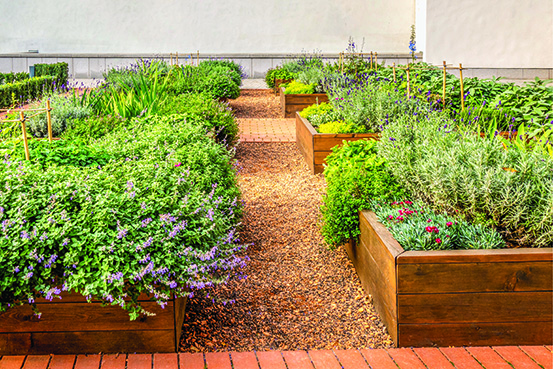Choose Gardens Over Lawns for a Healthier Community and Planet

By Livable Content Team
Single-family homes, duplexes, multifamily complexes and businesses have traditionally fought for idyllic lawns with the aim of causing envy among neighbors and passersby. But at Livable, we think we have a better idea!
It’s time to level up and consider trading the battle of lawn envy for a healthier, more colorful and more sustainable option: building a garden. Replacing lawns with gardens is a fantastic option for a better environment and overall way of living. Check out our reasons for installing a garden over the manicured grass, plus suggestions for the kind of garden you could opt for. Now is the time to start planning for an amazing garden this summer!
Gardens Eliminate the Need to Mow
Trade the hassle of lawn mowing for good! Utilizing what was lawn space as a community garden offers a more diverse landscape and eliminates the laborious chore of mowing. This saves you and the hassle of purchasing and storing a lawn mower! Not having to use a mower will also reduce energy dependency on things like gas and electricity for the beautification of a property. By swapping your lawn for a garden, you will conserve energy in a number of ways for yourself and the environment.
Gardens Reduce the Need for Poisons and Toxic Fertilizers
The amount of poisons required to maintain a perfectly manicured green space for your neighbor’s envy isn’t worth the impact it has on your health and the environment. Planting flowers, fruit and vegetables that are native to the area means they’re more likely to grow healthily without a ton of extra fertilizers that can seep into the ecosystem and cause algae blooms and other environmental problems.
While you may opt for pesticides in your new garden, the number of poisons placed in the ground and tracked inside on your shoes is greatly reduced by choosing the garden option. Eliminating the use of poisons also fosters richer and healthier soil: what’s good for the earth, is good for you! There are plenty of safer alternatives to pesticides such as neem oil and essential oils like peppermint, thyme and rosemary.
Edible Gardens Provides Food
Naturally, a vegetable garden is pleasing to look at in its colorful glory, but it also provides a community food source as well. Filling your forgotten lawn with nutritious foods that can be added to your salads, casseroles or soups is a much better option for long term health and well being.
Not enough room for carrots, potatoes or a pumpkin patch? Consider planting an herb garden in smaller lawn spaces. They take up a lot less room and are ideal for raised beds and window box-style planters. Enjoy the taste and health benefits of fresh herbs in your home cooking and in specialty cocktails. Growing herbs is a lot cheaper and more efficient than buying small, overpriced bundles at the supermarket.
A Flower Garden Supports a Healthier Environment
A flower garden is only colorful, fragrant and appealing to the eye. It also creates a healthier living space for the overall community in a multitude of ways. Flowers can help fight urban heat, decrease pollution and clean the air. Additionally, flower gardens are an excellent way to support the environment and foster wildlife by rejuvenating local bee populations and aid in the effort of pollination. Without bees, none of us get to eat – supporting their well being supports ours.
Rock Gardens and Xeriscaping Reduce Water Use
If you lack the time or green thumb required of a flower or edible garden, consider installing a rock garden. The simple, Zen rock garden option offers a welcoming and pleasant landscape and reduces the need for daily watering. Rock gardens are great for any climate and extremely low maintenance once installed. They can also add diversity in a larger space that allows landscapers to combine different garden types. The rock garden is a year-round space for your tenants to enjoy the tranquility and peace of the outdoors. Just add a bench or two! Choosing to replace your lawn for a rock garden greatly reduces expenses incurred by the lawn maintenance of water, electricity and pesticides.
Xeriscaping, which just means designing a landscape that requires little to no irrigation, is another low-water option. In communities in the Southwest, for example, many communities have ended regulations requiring expensive, water-wasting lawns. Homeowners can now plant gardens of cacti and other local indigenous plants that don’t need water beyond what they draw in from the air, soil and rainfall.
Gardens Foster Community
Whether you’re a property owner, manager or simply a private homeowner, swapping a crisp lawn for a lush garden organically fosters community among residents, neighbors and visitors. Gardens have a special way of naturally bringing people together as they encourage communities to share in conversing, gathering, exchanging, cooking and working together. They have also been shown to increase the emotional well-being of humans in a matter of minutes.
Whatever type of garden you choose, invite neighbors and friends to participate in building and visiting your garden for a greater sense of community. Encourage your residents to share in the labor of love that comes from growing their own food and herbs. Make it a group project!
Choosing a garden, no matter the kind, is a simple solution with a massive impact on conservation. Gardens offer a better way of life in a myriad of ways including healthier eating, more diverse landscapes, soil enrichment, wildlife support and happier communities. Make the change from lawns to gardens this spring and be sure to share the benefits you experience and enjoy through the process.
At Livable, we’re a one-stop shop to help you save money on utilities, including costly lawn watering. Contact us today to learn more about how we can help you recover money on master-billed utilities while encouraging your residents to conserve precious natural resources.



